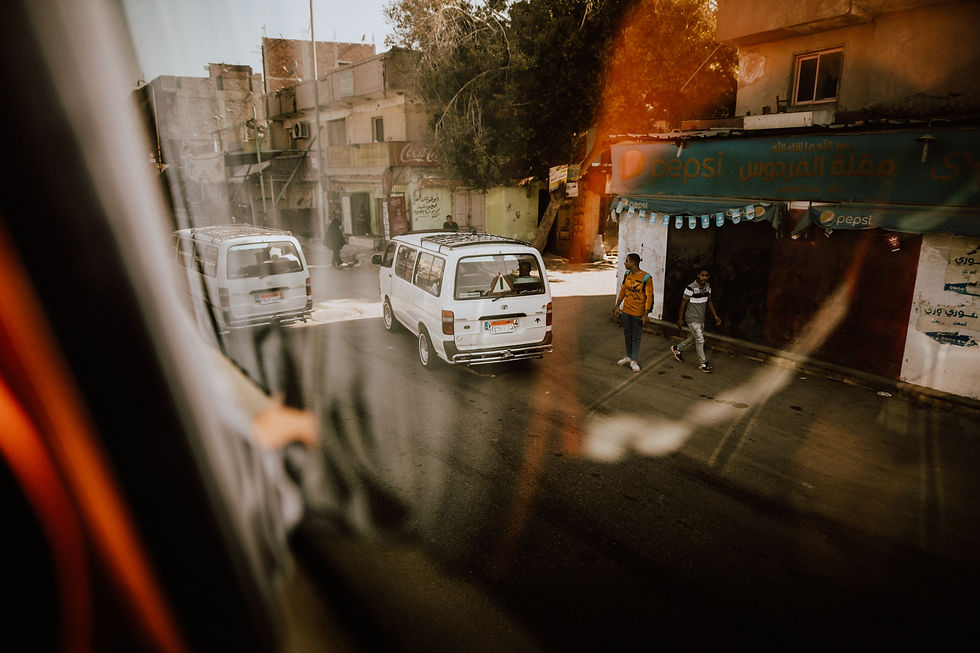A Difficult Word to Translate in your Mother Tongue
- Zeinab Eltaher

- Jun 25, 2024
- 3 min read
Updated: Nov 25, 2024
Have you ever encountered a word in your mother tongue that you didn’t know how to translate?
I was telling a non-Arabic speaking friend about a situation and “Tasaheel” was a challenging word for me to explain concisely. That word was the core of the plot so it was essential to give her an idea what it meant.

A few weeks ago, I took a minibus to Qena, a town an hour away from Luxor, my hometown. in Egypt. I went to a hearing solution company where I tried a pair of hearing aids. On my way back, I took another minibus. The driver asked me which highway I needed to take, the desert or the rural one. I replied, “The shortest one, please.” Afterwards, I asked him when we were expected to arrive. He immediately answered, “It is tasaheel”.
I wondered whether he could tell me the approximate arrival time. He angrily said, “I don’t know. This is in the hands of Allah. I might die as soon as I start driving the vehicle. We might have an accident or any disaster could happen! I say inshallah and rely on him.” I whisperingly said, “Oh, Lord! Why are you such a negative driver? Try to be a little bit optimistic, please!” He resumed saying, “You can look for another minibus if you are in a hurry.” Quietly embarrassed, I went back to the minibus.
The whole trip my heart was in my mouth. I kept nervously praying to Allah. “Please don’t kill us. Not today at least. Maybe on another day. The passengers would jump down my throat, thinking that I had intervened in your will. They might think I was the reason for their death because I wanted to know when we were arriving. All I wanted was just an answer to when, no more. Forgive me, please!”
Once we got off the minibus safe and sound, I happily breathed a sigh of relief.
That situation was really difficult to explain to my friend who was from a different culture and background. There was no one-word translation for it. I had to explain in detail when and why people say it, instead of them giving a straightforward answer.
People in my country, mostly Muslims, think that time and future are out of their control. They would hesitate to make firm statements about when things are going to be done.
They think that bad things might happen if they state the time or that the arranged event might never occur. Some people use tasaheel to express that something is totally dependent on God's will and/or uncontrollable circumstances. Inshallah is another word that we say almost all the time, hoping to have unpredictable things barred. Of course, some people use it as a sort of escapism or to mean “no” indirectly but this is not the genuine way to use it.
Nakba and Intifada are other words similarly challenging to translate from Arabic. It's not easy to explain either in just one word or even a few words. There are no adequate words in English, and maybe not in any other language, that could describe all the meanings and 70+ years of the complicated struggle included within both words,
What about you? Is there a word in your native language that you have found difficult to translate?
I am also asking my Arabic colleagues; do you have a similar word in your different dialects? What does it mean and when do people use it?
How would you translate or explain it in brief? Let me know your insights in the comments.




Thank you for inviting me to read this post. It means a great deal to me.
It helps me understand that we all experience life but maybe it could be better. It's a reminder to go within. Be in the now.
DaveL
Fascinating! I remember well from my days in Bangladesh that I would say to someone "See you in 5 mins" and even that would be met with the response "Inshallah". It made me wonder about the fragility of human decisions, and the unknowability of just about everything! :)))
There's a similar sentiment in the Breton "Kenavo", that translates to "Bye". But if you break it down to "ken a vo", you get something that we could (badly) translate with "until when (and of) it (our next meeting) may be" in English. The mix of hope, wishing, insecurity, and relying on an unknown future to make it (our next meeting) happen, is something I've sometimes struggled to explain.
It is a nice blog Zeinab. I agree inshallah is used many times in your culture. I have a student from Egypt and she always said that when she expect good news. In my culture, we have a word "pura vida" that means "hi", "bye", "thanks", and "I am doing well". In Costa Rica, we also say "chao" as farewell. But, it is not like the Italian word "chao" used to say both "hi" and "bye". By the way, I love reading your post. Shukran!
This is a very interesting story, I live with a native English speaker and we make a ton of funny puns between Arabic and English. This emotional and spiritual content of one word exists in all cultures and languages. One day an Algerian reported me to HR for saying (tis-tuf-li - تسطفلي) and I learned that I have to avoid the word because many Arabic speakers out of Syria don't know what it means and assume it a bad word. It literally means (you choose) =have it your way.